Everyone thinks the NBA is rigged and it’s definitely been true in the past with the 2007 NBA Betting Scandal. But with last nights final’s game many questionable fouls were called in the first half and the issue on everyone’s minds.
Last night I was talking with some friends and decided to actually look at some data.
The Data
For this analysis I have data personal fouls by team in the NBA Playoffs for the last 5 seasons (411 games). I separated the dataset into two by looking at teams that have the opportunity to clinch the series. For example: last night the Warriors were 3-0 against the Cav’s so they have the opportunity to clinch the series. I did not count 3-3 series because the incentive to prolong series is gone (but different incentives for rigging are still there).
Analysis of Fouls
I first computed a histogram of the two different classes as shown below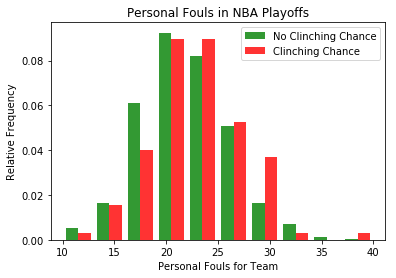
Already we can see that teams with a clinching opportunity look to have more personal fouls (subjectively callable by referees). When I looked at some summary statistics I found the mean of teams with clinching chances to be greater than those who don’t.
Plugging these values into a hypothesis tester I found that there is a 95% statistically significant difference in personal fouls based on clinching chances. The team with a clinching chance has a greater mean than the teams that don’t have the opportunity to clinch.
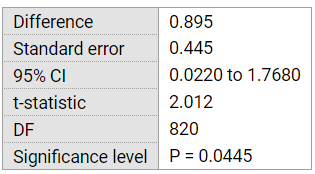
Conclusions
NBA teams that have the opportunity to clinch definitely receive more personal fouls. This is encouraging to suggest that the NBA is rigged however there can be a number of other factors that contribute to this result. A couple of examples of stats that weren’t accounted for: home/away, typical fouls by team, referee crews, and foul types. If anyone has more complete information on the type of fouls called that would really help. As well as more history. Needless to say, I think there is rigging in the NBA — intentionally or not.
To know for sure the book Mastering Metrics does a great job talking about how to account for confounding variables in observational studies. For my sake, I’m sold that the NBA is rigged and will add a isClinching flag to all my NBA betting models.
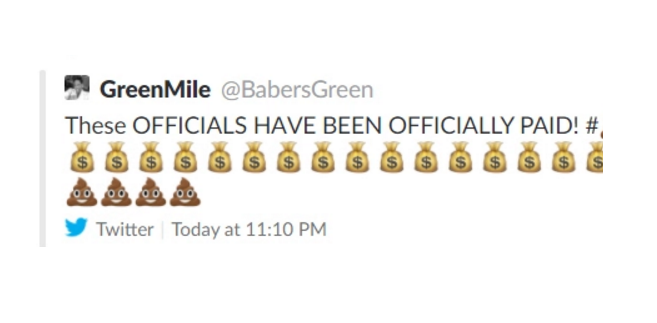
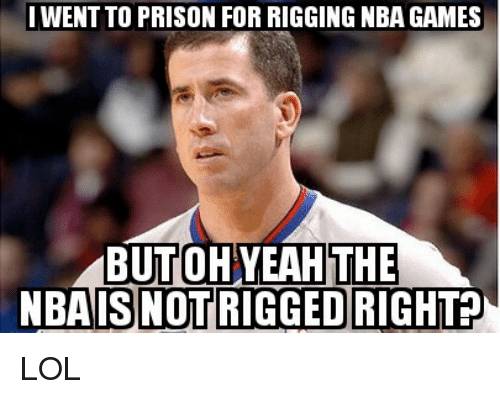
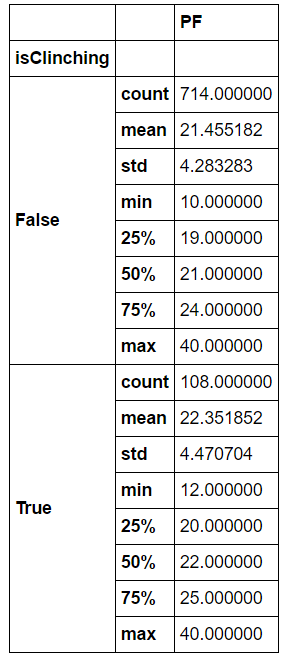
Here’s where your analysis falls short — THERE IS NO INCENTIVE FOR THE NBA TO PROLONG A SERIES.
The data you found would be compelling if, in fact, you could develop a reasonable conjecture as to why the potentially clinching team receives more foul calls. Your conjecture seems to be that the NBA wants to prolong a playoff series in order to earn more money. However, your conjecture is unreasonable; the NBA does not make more money through an extra playoff game.
The NBA earns the vast majority of its money through its TV deals. These contracts are not dependent on how many playoff games are played, they simply involve lump sums — in 2015, TNT and ESPN re-upped their contracts with the NBA to an estimated 2.6 billion dollars for permission to broadcast NBA basketball. They don’t pay the NBA extra money on the off-chance that there are more games in a playoff series.
As such, when a series is prolonged, TV networks make money, and individual franchises make more money through ticket sales. The NBA, however, does not.
The NBA is not rigged.
Even if the contracts are lump sums the NBA would be incentivized to increase the length because the advertisers would be happier and more likely to renegotiate for higher next time around. That and building the NBA’s viewership through heightened drama that could be created by a prolonged series. If the networks feel the playoffs have been boring, not lucrative, they could try to find other content. Reducing the value of the NBA
[…] gamers. Online casino scams can range from faux web sites that promise unimaginable payouts to rigged games that guarantee players never win. The Onca888 neighborhood shines a light-weight on these risks via […]